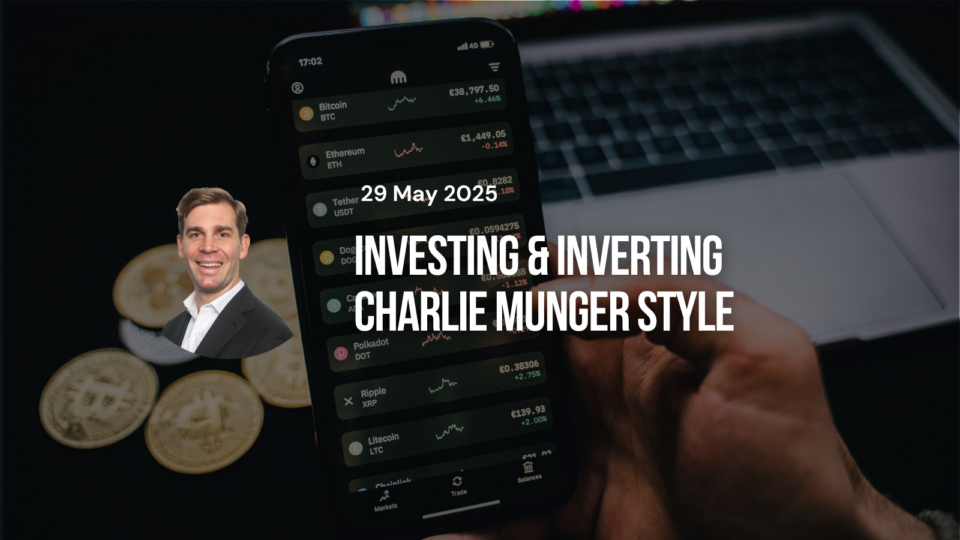

Positioning for uncertainty with Stock Doctor
By Tim Lincoln, Co-Founder and Managing Director, Stock Doctor
26 April 2023
It’s not boom or bust
It’s no secret that investing is a complex game to play. As a DIY investor, you face a host of challenges, including market volatility, economic uncertainty, and a vast and complex network of financial intermediaries who stand to profit from your every move. Meanwhile, the media bombards us with sensationalised headlines and a constant stream of news and opinion, making separating noise from valuable signals difficult.
Time and time again, I find myself conversing with DIY investors who have fallen victim to the trap of thinking…if it’s not a boom, then it must be a bust and vice versa. When we frame investing through that lens, you are either all in or all out and it’s a big mistake to think you can play that game and win. I have never seen anybody do it well, so we’ll always advocate that investors maintain an actively managed portfolio through the economic cycle.
It’s not a mistake to be alert to market risks; to understand the strategies and tools available to ensure you get the risk/reward dynamics right for your portfolio.
Shifting cycles and the denialists
Back in October, Matt Swartz, our Senior Portfolio Manager, and I delivered a presentation to the ASA. It warned investors to be vigilant as we exited an extended cycle of excessive monetary and fiscal stimulus, which has rewarded an unprecedented period of speculation. We highlighted the mountain of corporate debt that needs refinancing at much higher interest rates in the coming years and alerted investors on how best to identify the zombies. Since our presentation, the tightening cycle has continued, and corporate failures are featured in the headline!
Right on cue, the noise machine is back in full voice, declaring that the tightening cycle is over and that we can expect the stimulus engine to be fired up before the end of the year to solve all our problems.
Call me cynical, but I’ve always adopted the ‘you reap what you sow’ approach. Sure, the pandemic created a big supply chain problem, but it’s becoming clear (at least to me) that inflation has persisted far beyond the pandemic due to excessive stimulus. Hoping we go back to that environment is symptomatic of a horrible case of denialism. It will only create more inflation!
But isn’t the economy going well?
The economy has held up remarkably well in the face of the unprecedented shift in policy. The U.S. Federal Funds rates have increased by a factor of 20, and employment and economic activity have hardly blinked! Sure, some sting has been taken out of investment markets, particularly at the riskiest end of the markets like unprofitable tech & crypto – but for the most part, all seems ok.
However, tightening cycles work with a lag, and this delay has been exacerbated by excessive savings accumulated during the pandemic. It meant that consumers were afforded the balance sheet to manage through a period of a rapid decline in their real incomes, but it’s our view that the economic impulse received from a decline in savings may turn into a headwind as the year progresses. Recent fractures in the banking system will likely lead to slowing credit growth and tighter lending standards.

Now we aren’t in the business of making macro predictions, and there are enough economists out there better equipped to have that debate. But what concerns us is that the risk of recession does not appear to be priced into markets.

What you are highly unlikely to see is a recession that coincided with earnings growth. Typically, recessions have resulted in earnings declines of about 20-30%.

So given that recession risks are evident, it would seem prudent to actively manage your portfolios for the risks that lie ahead.
Wait, didn’t you just tell us not to fall into the trap of boom-and-bust investing?
Absolutely.
At Stock Doctor, we build through-the-cycle portfolios. We aren’t interested in playing momentum when the bulls are running and rushing for cover in defensive stocks or even out of the market entirely when the noise machine tells us to panic.
We identify factors that we believe are important for a company’s longevity and success:
1. Financial Health
2. Capital Efficiency
3. Earnings quality
4. Adequate & defendable profit margins
Once you have the framework to build an actively managed portfolio, with appropriate diversification, you can approach these fragile points in the economic cycle with confidence and peace of mind that you have a strong stable of companies that can navigate best through uncertain economic periods.
From this point, you can prepare your asset allocation strategy to take advantage of the opportunities a volatile market often brings. If the risks to market earnings don’t appear priced in, as we think is the case, keep some powder dry with cash on the sidelines.
Alternatively, you can use the wonderful tools available on the market, such as inverse EFTs, that can be held to hedge market risks efficiently. It’s a strategy known as beta hedging. In effect, you can actively manage the beta (market risk) level in your portfolio whilst also generating positive returns by staying exposed to your stock selection decisions (the alpha). However, it’s important to note that beta hedging strategies require active management. They aren’t designed to buy and hold, so do your research and invest confidently.
I finish this piece in a similar tone to how it began. We’ve been helping DIY retail investors for decades and know that managing an equity portfolio is challenging, particularly during cycle shifts. Don’t make the mistake of becoming paralysed into complacency or trying to go all in or all out. It doesn’t have to be that hard or stressful. Stick to quality and ensure you use the right research tools to navigate the volatility.
Let Stock Doctor help you manage your portfolio with a 14-day free trial.
This content is provided by Lincoln Indicators Pty Limited (Lincoln) ABN 23 006 715 573, as Corporate Authorised Representative of Lincoln Financial Group Pty Ltd ABN 70 609 751 966, AFSL 483167. This communication may contain general financial product advice or forward-looking statements regarding our intent, belief or current expectations with respect to the market conditions. Caution is advised to place undue reliance on these forward-looking statements, as our advice has been prepared without taking account of your personal circumstances. Therefore, you should consider its appropriateness, in light of your objectives, financial situation and needs, before acting on it. Please refer to our Financial Services Guide (FSG) for more information at Lincoln Indicators Pty Ltd.





